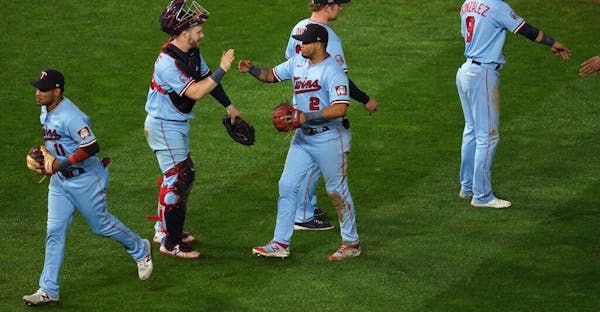The tattoo is conveniently located on his left forearm, a perfect spot in his line of vision when Sergio Romo looks to his catcher to get his sign or comes set on the mound.
He doesn't glance at the words scripted on his arm before every pitch. Only tense moments when self-doubt might creep in. A one-run lead with a runner on third base. A 3-2 pitch. A tough hitter at the plate.
In those moments Romo will scan his arm for a split second as a reminder that he's ready for this challenge. Of all the tattoos that canvas his upper torso, that one is his favorite, because of the meaning in the words:
Without struggle there is no progress.
"This is when I'm going to learn about myself," he said. "This is where I'm going to grow up and take a step forward from the person I was a year ago, a week ago, a day ago, a moment ago. It reminds me that I've struggled before, and I've progressed through it. I can't be afraid. There is no room for fear."
Pushing fear aside doesn't guarantee success in that moment, but Romo's entire existence — not just pitching in pressure moments as a Twins late-innings reliever — is encapsulated in two words tattooed on his neck, behind his thicket of a beard, below his right ear: Live free.
He loves that motto. He lives his life in accordance.
"Be yourself," he says. "Live free. Worry-free. Anxiety-free. Stress-free. As much as I can, I try to. Why? There are so many demons in this dang world as it is. I control how I feel. I try my best to not give anyone any negative power over me."
Welcome to Sergio Romo's universe. A wacky place. A happy place. An introspective place. A confluence of contradiction.
“I feel I have a universal personality. I mesh well everywhere I go. I can have a conversation with anybody.”
Baseball scouts showed little interest in him out of high school or college because he's smallish in size with a fastball that lacks sizzle. Yet he's in his 13th MLB season with three World Series rings and an All-Star appearance on his résumé.
Being overlooked because of physical traits was a theme he smashed into a million pieces because nobody measures what he believes are his three best competitive attributes: his heart, his backbone and his, um, guts.
On the mound, he's a spitfire competitor. People have told him he pitches angry, like a monster lives inside of him. So he had a demon tattooed on his right arm.
Off the field, he's a goofball, and a deep thinker. His body ink tapestry includes an image of the Sistine Chapel with a sunset in the background. A reminder to himself that "love is worth fighting for," he says.
Romo takes delight in photo-bombing TV interviews. His entrance song on the way to the mound — "El Mechon" by Banda MS— reflects his boundless energy. He filled the Twins' summer training camp with scattershot commentary and friendly heckling of teammates during intrasquad scrimmages.
He's 37 going on 17.
"When I'm at work, it's easy for me to enjoy it," he says. "I feel privileged to be here. I often joke to myself, how did I weasel myself into this position?"
Growing up in the game
To understand how, start at Point A.
Romo was born in Brawley, Calif., a town of 27,000 located in the Imperial Valley, 113 feet below sea level and short car ride from Mexico's border.
Romo's parents are Mexican, and he proudly proclaims himself Mexican American. His back is covered with a tattoo of the American and Mexican flags joined together.
"I was born in the States with Mexican parts," he says.
His father, Frank, played amateur baseball in an adult league in Mexicali, Mexico. He had dreams of playing professional baseball in Mexico, but his father, a farmer, found that career path too unstable and discouraged it. Families stick together to work, he said. So Romo's father enlisted in the Navy and after service became a mechanic.
Romo idolizes his dad. He calls him the best amateur baseball player he's ever seen, a third baseman who could do it all. Romo compares his dad's relentless style of play to Pete Rose's. He never finished a game with a clean uniform.
As a kid, Romo accompanied his dad to games in Mexicali and would sprint to retrieve his home runs after they landed in neighboring yards. He beamed with pride listening to family friends tell stories about his dad's talent and how he should've been a pro player.
"I credit my dad 100 percent for instilling baseball into my heart," he says.
His dad built a pitching mound in the backyard and taught his son how to pitch. Romo can still hear his lessons: Rock, step, fire.
Romo started playing in Mexicali at age 14. Still a kid facing grown men. This is where a competitor's edge took root. No room for fear.
"It helped create a lot of backbone in this smaller frame," he says.
Romo was 11 when he made a promise to his dad. He still remembers it in vivid detail. His dad was recovering from rotator cuff surgery and was worried he might not play again. It was a Wednesday night and they were watching a game on TV, Braves vs. Pirates. Steve Avery was on the hill for Atlanta.
Romo knew his dad would never get to fulfill his dream of playing Major League Baseball. I'll make it there for us someday, young Sergio told him. That was the first time he saw his dad cry.
“There are so many demons in this dang world as it is. I control how I feel. I try my best to not give anyone any negative power over me.”
College wheel of fortune
A pro career sounded like a pipe dream when no colleges offered Romo a scholarship out of high school. He considered enlisting in the Navy, as his father had. He took the Armed Services Vocational Aptitude Battery test, which recommended a job as a sonar technician. He was a "signature away" from choosing that path.
Baseball was in his heart, though. He believed in himself. So he accepted a walk-on spot at Orange Coast College to play for famed coach John Altobelli, who died in the same helicopter crash that killed Kobe Bryant in January.
Romo ended up attending four different colleges in four years through a variety of circumstances. His final stop came at Division II power Colorado Mesa University (formerly Mesa State).
"He's still the absolute best competitor I've ever coached," said Chris Hanks, who has been in charge for 22 years at that school and taken the Mavericks to national championship games twice in the past six years.
Romo was a starter back then. He informed Hanks during one meeting that he planned to throw a lot of fastballs to keep his pitch count low because he didn't like anyone finishing games he started. He set a school record for complete games that season with 11 in 15 starts.
He employed a quirky game plan on occasion. Romo would throw only fastballs the first time through an opponent's order. When the lineup turned over, he would incorporate his slider — his best pitch — using a higher arm slot. In the seventh or eighth inning, he would lower his arm slot to almost sidearm delivery. It was as if his opponent faced three different pitchers.
Romo set a handful of school records that season, including wins and strikeouts. His only loss came against a conference rival during the regular season. He faced that same team in an NCAA regional. He had a no-hitter broken up in the ninth inning in a complete-game victory.
Despite his dominance, pro scouts showed little interest. Too small, not overpowering enough, yada, yada, yada. Hanks got annoyed by it. He told a San Francisco Giants scout he knew that "if you don't give him a couple thousand bucks and a plane ticket, you're an idiot."
The Giants selected Romo in the 28th round of the 2005 draft.
He made his MLB debut in 2008. He pitched in Game 1 of the 2010 World Series. Two years later, he struck out the side in the 10th inning to complete the Giants' World Series sweep of the Detroit Tigers.
Fear? Pfft.
"There is a certain persona that you have to take on," he says.
Romo World
Pitching guile has served him well, too. That and a nasty slider that is accentuated by his slingshot delivery.
Romo has thrown a slider on 53.8% of his career pitches, the third-highest rate among all MLB pitchers since 2002, according to FanGraphs. He owns a career 2.92 ERA and his 4.77 strikeout-to-walk ratio ranks among the top 20 relievers since he entered the league. Control and movement have given him longevity.
Is there any wonder then that his favorite baseball player ever — his No. 2 idol behind his dad — is Hall of Famer Greg Maddux, the master of control and movement.
Romo met Maddux a few years back. Picture a kid meeting his athletic hero. That was Romo, who melted into "fanboy" mode before pulling himself together.
Romo can name every pitching coach he's had since high school and what advice each one gave that he has incorporated into his repertoire. A tweak to his mechanics here, a grip adjustment there, a reminder about balance and tempo. He absorbed all of it. Even the coach in Colorado who taught him how to manipulate the ball at higher altitude.
The coach who had the most influence on his career was former Giants bullpen coach Mark Gardner, who called Romo "Mijo" — my son — and encouraged him to ditch his windup. Gardner taught him to simplify his motion and his mind-set.
The passion that erupts out of Romo on the mound ties it all together. He punctuates inning-ending strikeouts with a primal scream, a Tiger Woods fist pump, a gesture to the sky.
He means no disrespect to opponents. It's not about showing anyone up. It's about showing himself.
"I feed off everyone's energy," he says. "I feed off the fans' energy. I physically feel it on my skin."
Romo clearly is comfortable, but he admits that he deals with his own insecurities. He has bad days just like everyone else. His mood only seems to be set on joyful 24/7.
"I love the guy to death," teammate and veteran reliever Tyler Clippard said. "I really hope he continues to be himself and get crazy because why not? This season is going to be stressful as it is. We might as well have fun with it when we can."
Teammates received a full dose of Romo World in this training camp restart. If he's not ribbing players from the bullpen, Romo is pulling them aside to learn more about them. And not just surface how-ya-doin'? conversations. He wants to go deep, especially with young players who sometimes aren't sure how to respond when he asks them, "What about you makes you you?"
"I feel I have a universal personality," he says. "I mesh well everywhere I go. I can have a conversation with anybody."
Sometimes the conversation is with himself. He'll give himself a reminder when he's on the mound, in a pressure spot, about to deliver the pitch. He's been here before and come through it.
No fear. Live free.








